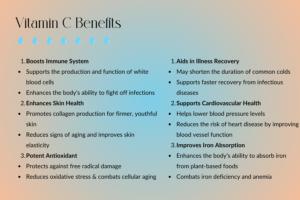
Vitamin C Infusions: A Comprehensive Guide to the Benefits
April 19, 2024
Vitamin C IV therapy, a method where Vitamin C is administered intravenously, has seen a surge in popularity as individuals seek enhanced methods for maintaining and improving their health. This form of therapy allows for higher concentrations of Vitamin C to be delivered directly to the bloodstream, bypassing the digestive system and potentially offering more significant health benefits than oral supplementation. Historically, Vitamin C was first noted for its importance in preventing scurvy among sailors. Over time, its use has expanded, with Vitamin C IV therapy becoming a sought-after wellness treatment for a variety of purposes. It’s crucial to note the importance of consulting healthcare professionals before undergoing any form of vitamin therapy to ensure it’s appropriate for your health needs and conditions.
Understanding Vitamin C

Vitamin C: Roles, Requirements, and Rich Sources.
The Role of Vitamin C in the Body
Vitamin C plays a crucial role in the body as a potent antioxidant, helping to protect cells from damage caused by free radicals. It’s also essential for the synthesis of collagen, which is vital for wound healing and the health of skin, blood vessels, bones, and teeth. Furthermore, Vitamin C supports the immune system, enhances iron absorption from plant-based foods, and aids in the regeneration of other antioxidants within the body.
Daily Requirements and Sources of Vitamin C
The recommended daily intake of Vitamin C varies by age, gender, and life stage, but generally, adults are advised to consume 65 to 90 milligrams per day. Rich dietary sources of Vitamin C include citrus fruits, strawberries, kiwi, bell peppers, dark leafy greens, and tomatoes. Despite the availability of these sources, achieving optimal levels solely from diet can be challenging for some.
Limitations of Oral Intake Versus Infusion
Oral intake of Vitamin C is limited by absorption rates in the digestive system, meaning that only a portion of what is consumed is actually utilized by the body. Excessive oral doses can also lead to gastrointestinal discomfort and other side effects. In contrast, Vitamin C IV therapy allows for much higher doses to be administered directly into the bloodstream, potentially enhancing its efficacy and bypassing digestive system limitations.
The Process of Vitamin C Infusion
Detailed Description of the Infusion Process
The Vitamin C IV therapy process involves administering a high dose of Vitamin C directly into the bloodstream through an IV drip. This procedure is typically performed in a clinical setting under the supervision of healthcare professionals. The infusion can last anywhere from 20 minutes to an hour, depending on the dosage and the individual’s health condition.
Types of Vitamin C Infusions
Vitamin C IV therapy can vary in terms of dosage and the addition of other nutrients:
- High-dose Vitamin C: Primarily used for immune system support and in some cases, as part of complementary cancer treatment protocols.
- Combination therapy: Vitamin C is combined with other vitamins and minerals, such as B vitamins, magnesium, and zinc, to target specific health issues or overall wellness.
How to Prepare for a Vitamin C Infusion Session

Experience the Comfort and Professionalism of Vitamin C IV Therapy Sessions.
Preparation for a Vitamin C infusion session may include staying hydrated, eating a light meal to prevent nausea, and discussing any current medications or health conditions with the provider to avoid potential interactions. Proper preparation ensures a smoother and more effective infusion experience.
Understanding what Vitamin C IV therapy is used for and its process can empower individuals seeking alternative or complementary methods to support their health and wellness goals. With its direct delivery system and the ability to achieve higher, more beneficial concentrations of Vitamin C, this therapy offers a distinct approach to enhancing overall health, immune function, and more.
Health Benefits of Vitamin C Infusions
Immune System Support and Enhancement
One of the primary reasons individuals seek out Vitamin C IV therapy is for its immune-boosting capabilities. Vitamin C plays a critical role in enhancing the body’s immune defense by supporting various cellular functions of both the innate and adaptive immune systems. It aids in the production of white blood cells, helps these cells function more effectively, protects them from damage by potentially harmful molecules like free radicals, and supports the skin’s barrier against pathogens.
Potential in Illness Recovery and Prevention
Vitamin C IV therapy is commonly used for its potential to aid in the recovery and prevention of illnesses, such as the common cold and influenza. High doses of Vitamin C, when administered intravenously, can help reduce the severity and duration of cold symptoms. This benefit stems from Vitamin C’s role in immune system enhancement and its anti-inflammatory properties.
Antioxidant Properties and Its Effects on Aging
Vitamin C’s potent antioxidant properties combat free radicals, thereby reducing oxidative stress, which is a key factor in the aging process. By neutralizing free radicals, Vitamin C IV therapy can help mitigate some of the cellular damage that leads to aging, offering a more youthful appearance and potentially slowing the progression of age-related diseases.
Contribution to Skin Health and Collagen Production
A significant benefit of Vitamin C IV therapy lies in its contribution to skin health and collagen production. Vitamin C is vital for the biosynthesis of collagen, a protein that helps keep our skin firm and youthful. By promoting collagen production, Vitamin C infusions can enhance skin elasticity, reduce wrinkles, and improve overall skin condition.
Potential Side Effects and Considerations
Common Side Effects
Although Vitamin C IV therapy is generally well-tolerated, there are potential side effects, with the most common being discomfort at the infusion site, including possible redness or swelling. Some individuals may experience a cooling sensation during the infusion or a taste of vitamins in their mouth.
Potential Risks and How to Mitigate Them
Potential risks of Vitamin C IV therapy include infection at the infusion site, vein inflammation or damage, and in rare cases, overload of Vitamin C leading to metabolic disturbances. To mitigate these risks, it’s crucial to select a reputable healthcare provider experienced in administering IV therapy, who employs sterile techniques and closely monitors the patient throughout the process.
Importance of a Personalized Approach and Medical Supervision
Emphasizing the importance of a personalized approach and medical supervision cannot be overstated. Before undergoing Vitamin C IV therapy, individuals should undergo a thorough health evaluation to determine if the treatment is appropriate for their specific health conditions and needs. This tailored approach ensures that patients receive the optimal benefits of Vitamin C IV therapy while minimizing potential risks.
Vitamin C IV therapy offers a range of health benefits, from bolstering the immune system to enhancing skin health. However, understanding what Vitamin C IV therapy is used for, acknowledging potential side effects, and undergoing treatment under professional guidance is essential for achieving the best outcomes.
Individuals with Specific Health Conditions
Vitamin C IV therapy has been sought after by individuals with various health conditions for its potential therapeutic benefits. Those suffering from chronic fatigue syndrome, fibromyalgia, and certain autoimmune diseases might experience symptomatic relief and improved quality of life through these infusions.
Those Looking to Boost Their Immune System
Given Vitamin C’s pivotal role in immune system support, individuals seeking to enhance their body’s defense mechanisms, especially during flu seasons or in times of a pandemic, may greatly benefit from Vitamin C IV therapy. The direct infusion into the bloodstream can provide a quicker, more efficient immune boost compared to oral supplements.
Considerations for People with Certain Medical Conditions or Health Histories
While many can benefit from IV therapy, it’s not suitable for everyone. Individuals with conditions such as hemochromatosis (where the body stores too much iron), G6PD deficiency (a genetic enzyme deficiency), or those with a history of kidney stones should approach Vitamin C infusions with caution. Consulting with a healthcare professional to evaluate the risks and benefits specific to one’s health condition is crucial.
Choosing the Right Provider
Criteria for Selecting a Mobile IV Therapy Provider for Vitamin C Infusions
When choosing a mobile IV therapy provider for Vitamin C infusions, there are several key factors to consider:
- Licensing and Certification: Ensure the provider is licensed and their medical staff is certified to administer IV therapies.
- Experience: Opt for providers with extensive experience in administering Vitamin C IV therapy, as they are more likely to understand the nuances of the treatment.
- Safety Standards: Confirm that the provider adheres to the highest safety standards, including the use of sterile equipment and solutions.
Importance of Certifications, Cleanliness, and Professional Guidance
The provider’s certifications and commitment to cleanliness are non-negotiable aspects of choosing a mobile IV therapy service. These factors directly impact the safety and efficacy of the treatment. Additionally, professional guidance from knowledgeable staff ensures the therapy is appropriately tailored to your health needs and goals, maximizing the potential benefits of the therapy.
Questions to Ask Your Provider Before Undergoing Treatment
Before scheduling your IV therapy, consider asking the following questions to your provider:
- What is your experience with administering Vitamin C infusions?
- How do you ensure the safety and cleanliness of the IV therapy process?
- Can you customize the Vitamin C infusion based on my specific health needs?
- What should I expect during and after the infusion in terms of side effects and outcomes?
Selecting the right mobile IV therapy provider is a critical step in ensuring you receive quality care and achieve the desired health benefits of IV therapy. By thoroughly vetting potential providers and seeking professional guidance, individuals interested in Vitamin C infusions can make informed decisions, enhancing their health and wellness journey.
Vitamin C IV therapy offers a wealth of benefits, from bolstering the immune system to enhancing skin health, making it a valuable component of modern wellness practices. As we’ve explored its roles, benefits, and the critical choice of provider, the importance of informed decision-making and professional oversight cannot be overstated. If you’re ready to discover how Vitamin C IV therapy can uplift your health journey, contact Uplift IV Wellness today to schedule your mobile IV therapy appointment and embrace a personalized approach to wellness.